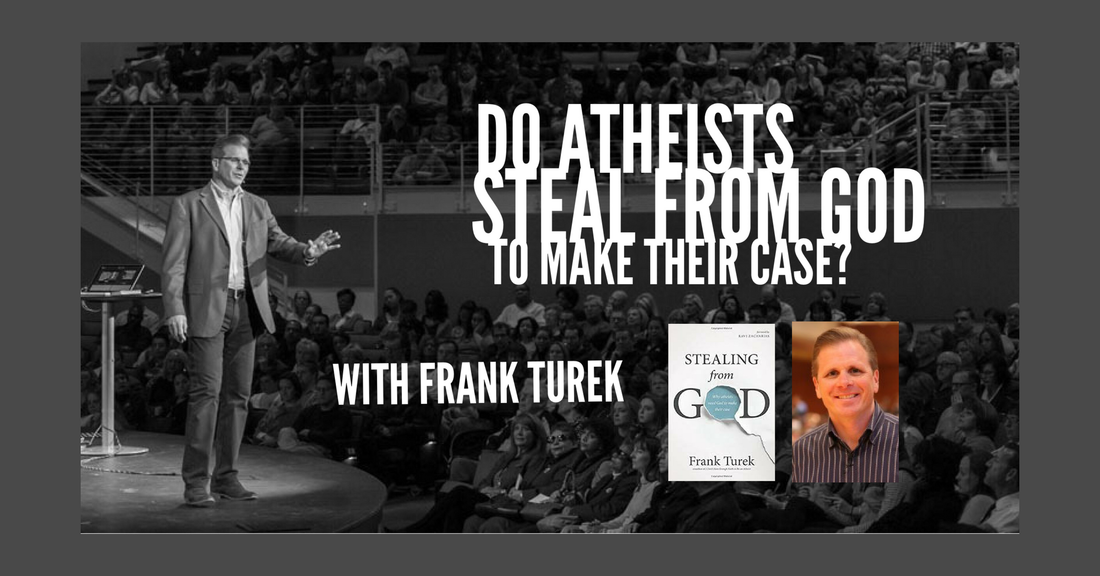Do Atheists Steal From God to Make Their Case? With Frank Turek — The Alisa Childers Podcast #226/1/2018 What is it like to visit college campuses and field questions from an audience who is hostile to your Christianity? What are the toughest questions asked on university campuses? How do atheists steal from God to make their case against Him? We talk about all this and more with today's guest, Frank Turek.
If you enjoyed this post, please subscribe to have my weekly blogs and podcasts delivered directly to your inbox.
25 Comments
I'm not sure if Turek is a presuppositionalist, but some of the arguments he trots out are all pretty typical of presuppositionalism. The flaws in those arguments are, of course, fairly well-known. For instance, Turek conflates objective and relative morality when he accuses moral relativists of having no moral standard. They *do* have a moral standard---only it's not objectively determined, according to them. To say otherwise is sorta like saying that if I point out the rules of chess are subjectively determined then I'm denying that chess has any rules!
Reply
Alisa Childers
6/1/2018 02:44:24 pm
Hi Ben. Frank is definitely not a presuppositionalist. I don't believe he is denying that atheists have moral standards....in fact, most atheists are quite opinionated when it comes to what they think is right and wrong. (Dawkins has no problem accusing the God of the Bible of being morally repugnant.) However, they fail to successfully defend the *objective* standard by which they claim something to be moral or immoral. Defining something as good or evil is not the same as defending why that something is good or evil. An "is" does not equal an "ought."
Reply
Alisa Childers,
Alisa Childers
6/1/2018 03:52:42 pm
The word "objective" is clarifying and important because it means that the standard is outside of personal opinion or feeling. It's a fact that is independent of the person uttering it. (Like 2+2=4....it's true whether or not someone believes it to be true.) This is what is meant by "objective morality." This isn't just something apologists came up with...philosophers have debated objective vs. subjective morality ad nauseam. 6/1/2018 05:07:55 pm
Hey Ben. Most presuppositionalists do not even use theistic proofs and when they do like Frame, they usually only do so in a highly secondary manner. The fact that Turek so strongly advocates the moral proof for the existence of God should have right there tipped you off that he is not a presuppositionalist. My guess is that based on a very superficial reading of both presuppositionalists and Turek you came to your conclusion because presuppositionalists rightly make the point that all other worldviews knowingly or unknowingly borrow from the Christian worldview because the foundations of that worldview are basic to our humanity. I am not a presuppositionalist and so I do agree that there are some philosophical problems with their approach. However, a lot of what they say is correct. They are correct to point out the fact that all knowledge is based upon first principles of knowledge that are foundational and self-proving and cannot be proven by means outside of those very principles. I as a proponent of classical apologetics believe that we should still assert these first principles and argue from there. I believe that a failure to do this results in circular argumentation and thus my rejection of presuppositionalism. But I also have to admit that at the end of the day a lot of people will simply dismiss those first principles and there isn't a lot we can do about that and on that front the presuppositionalist is on strong ground because at that point all we can do is point to the contradictions in the worldviews of others, which is the primary way that presuppositionalists argue from the outset. A lot of people believe that the two approaches are wildly at variance with each other, but that isn't really the case for those who have read deeply from both camps. The differences are primarily about starting point and I believe that the classical position is stronger on that front.
Reply
Again, words like "objective" or "absolute" I find more obfuscating than clarifying. Suffice it to say that atheists can and do make valid moral judgments. What kind of standards they use, and where those standards come from, are difficult questions, to echo David Silverman from his debate with Turek. But I've never seen any good argument to show that a moral standard must have its origin in God. In fact, I've never seen any good explanation of how God's nature could (as Turek alleges in the Silverman debate) constitute a moral standard at all, whether objective or otherwise.
Alisa Childers
6/1/2018 06:24:10 pm
You wrote, "Atheists can and do make valid moral judgments." My questions is, by what standard can you justify whether or not a moral judgment is "valid"?
Alisa,
Alisa Childers
6/1/2018 07:13:01 pm
Thanks Ben, but that wasn't my question. Respectfully, I'd truly like to know what, in your mind, makes a moral act "valid" or invalid.
Ben
6/2/2018 09:31:06 am
Alisa,
Alisa Childers
6/2/2018 11:02:49 am
Thanks for your honesty, Ben. Again, I wasn't asking about the origin or exact content of the moral standards we *use.* I am asking what makes those moral judgments valid or invalid. Was Hitler making a valid moral judgment to kill Jews? Why or why not?
Ben
6/2/2018 11:35:13 am
Well, I guess when I said that atheists can and do make "valid" moral judgments, I meant that the judgments have some force or pull in their context. And yes, Hitler's moral judgments certainly had that.
Alisa Childers
6/2/2018 04:03:16 pm
Interesting that you had to change the definition of the word in order to avoid answering the question again. I have to move on with my day so I’ll just end with this. If you can’t condemn Hitler’s actions as objectively evil, surely you can understand why so many people find this to be an incoherent, and intellectually unsatisfying view of morality. I thank God that MLK Jr. did not have that worldview. He said, “Never forget that everything Hitler did in Germany was legal.“ He understood that morality is objective… measured against standard of perfection..... not rooted in the subjective opinions of people and legal systems. You can’t know what a crooked stick looks like unless you have some idea of a perfectly straight one.
Ben
6/2/2018 05:49:16 pm
A.C.,
Alisa Childers, 6/1/2018 06:12:44 pm
But that's just it Ben, the rules of chess are most certainly not universally binding. I often play games with my kids and we change up the rules and there is nothing immoral about that. You can say that if we were to do that with chess we wouldn't actually be playing chess, but that would not be so. There is no one universal way to play chess. The way chess is played in professional tournaments is very different than the way your average father and son play chess together. You can say but within the professional tournaments there are hard and fast rules. Yes, but again, these are still not universally binding. No one is forcing the leaders of these tournaments to make these rules, there is no objective universal outside standard of chess that they are trying to adhere to. They make up the rules as they see fit. And no one is forcing anyone to play in these tournaments either.
Reply
6/1/2018 07:39:41 pm
Before I say anything, I do want to say that even though I know I get pumped up sometime, you are overall a pretty cool guy Ben. Many atheists I have debated with on blogs can get just downright nasty and are often laced with profanity. You were very frustrating at times on my website, but you were always respectful. Please know that nothing I say is personal, I am simply brimming with passion regarding these issues.
Reply
6/1/2018 07:51:56 pm
Ben, Turek and countless others down through the history of the church have indeed given painstakingly detailed explanations as to why the nature of God is the only explanation for universal absolute morality and they not only wash, they again are the only viable explanation available.
Reply
Ben
6/2/2018 10:43:13 am
Dan,
Reply
6/2/2018 01:30:16 pm
Ben, with the utmost respect, you so often confuse categories that it is honestly very hard to even keep up with all of your confusion sometimes. Yes, if we both agree upon the rules of the version of chess we are playing and you checkmate my king you have won the chess game, that would be an objective fact. But what is subjective and relative are the initial rules of the game themselves. A person or persons made up those rules and not according to any larger absolute standard and the reasons why this person or persons chose these particular rules were subjective reasons. The reasons why the two of us are choosing to play this game of chess and according to the version of the rules that we are agreeing upon would also all be subjective reasons.
Ben
6/2/2018 02:58:20 pm
Dan,
Reply
6/2/2018 06:01:38 pm
Ben, I am genuinely in my heart of heart not trying to be mean or overly hard on you, but you really are an extremely evasive person in debate, often engaging in equivocation and just plain slippery intellectual dishonesty. I am not even sure if Alisa will even post this because of such a sharp critique, but those things need to be said and I hope she does.
Reply
Ben
6/2/2018 08:08:14 pm
Dan,
Reply
6/2/2018 09:14:14 pm
Ben, if I have ever been truly condescending, rude, or insulting I genuinely apologize. I would be the first to admit that I let my passion get the best of me sometimes. On that note, this will be my last response to you regarding this particular post and I will gladly give you the last round as far as this battle between us goes.
Reply
Your comment will be posted after it is approved.
Leave a Reply. |




 RSS Feed
RSS Feed


